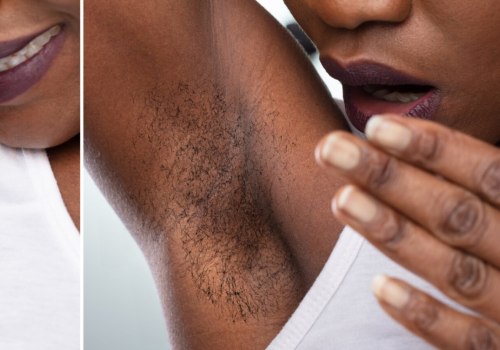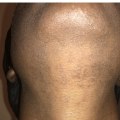When considering laser hair removal treatment, it is important to understand the potential risks associated with the procedure. One of the most common mental health risks associated with laser hair removal is feelings of regret or guilt post-treatment. In this article, we will explore how these feelings can manifest, and what steps can be taken to mitigate them. Regret and guilt can be powerful emotions, and feeling them after a medical procedure can be overwhelming. These feelings can range from mild to severe, and can have a lasting impact on how an individual thinks and feels about themselves.
It is important to understand how these feelings can arise and how they can be addressed in order to make informed decisions when considering laser hair removal treatment.
Regret and Guilt
are two very different emotions that can be experienced after laser hair removal. Regret is a feeling of sadness or disappointment in oneself for making a choice, while guilt is the feeling of having done something wrong. Both emotions can be experienced post-treatment if the results of the procedure are not as desired, or if the patient is not satisfied with the outcome. When it comes to signs and symptoms of regret and guilt, they can vary from person to person.Some people may experience feelings of sadness, anger, disappointment, or frustration. Others may feel embarrassed, ashamed, or regretful for having gone through with the procedure. It’s important to recognize these feelings and take the time to process them. There are a few strategies people can use to cope with feelings of regret or guilt post-treatment. Talking to friends or family about the experience can be helpful in relieving some of the feelings and gaining support from those close to you.
Journaling can also be an effective way to work through any emotions and gain clarity. Additionally, if the feelings become too overwhelming, seeking professional help from a therapist or counselor can be beneficial. It’s important to keep in mind that there are risks associated with laser hair removal, such as pain or scarring. In addition, not seeking treatment if needed can lead to possible complications. For this reason, it’s important to research the procedure beforehand and talk to a medical professional about any questions or concerns. Recent research has highlighted the potential mental health impact of laser hair removal.
A study conducted in 2018 found that people who experienced regret post-treatment were more likely to suffer from symptoms of depression and anxiety. This suggests that there are mental health risks associated with laser hair removal, and it’s important to be aware of them before undergoing the procedure. For those considering laser hair removal, it’s important to have realistic expectations about the outcome. It’s also important to consult with a doctor or dermatologist beforehand to ensure that the procedure is safe for you. Finally, don’t forget to take the time to process your emotions after the procedure if needed.
What is Regret and Guilt?
Regret and guilt are two very similar emotions, but they are not the same.Regret is an emotion that is felt when we regret an action or decision we have taken in the past. This regret can come from a variety of sources, such as a missed opportunity, a mistake, or a decision that was not beneficial. Guilt, on the other hand, is an emotion that is felt when we believe we have done something wrong or hurtful to someone else. When it comes to laser hair removal, people may experience regret or guilt post-treatment for a variety of reasons.
For example, some may regret the decision to get laser hair removal due to its permanence, while others may feel guilty because they feel they are changing their appearance too drastically. Additionally, some may feel guilty because they believe they are not taking good care of their body or health by having the procedure done. It is important to remember that these feelings are perfectly normal and can be managed with proper self-care and support. It is also important to seek professional help if these feelings become overwhelming or interfere with day-to-day life.
Signs and Symptoms of Regret or Guilt
Feelings of regret or guilt after a laser hair removal procedure can manifest in various ways, including physical and emotional signs.Physically, someone may feel a sense of unease, restlessness, or discomfort in the area where the laser was applied. This can be accompanied by redness, soreness, swelling, or other physical symptoms. Emotionally, someone may feel remorseful, embarrassed, ashamed, or guilty for having the procedure done. They may also feel regret for not being able to control the outcome or for not being able to anticipate the potential risks and side effects. People may also experience guilt for not being able to undo the procedure or for wanting to do something that goes against their personal beliefs.
This can lead to negative self-talk, self-loathing, and even depression. It's important to recognize these feelings and understand that they are a normal part of the healing process. If the feelings persist over time and begin to interfere with day-to-day activities, it may be time to seek professional help.
Potential Risks Associated with Laser Hair Removal
Laser hair removal is generally a safe procedure, however, there are some risks associated with the treatment. The most common side effects are pain, redness and swelling at the site of treatment. In some cases, the laser can cause scarring or changes in pigmentation.There is also a risk of infection, though this is rare. Additionally, some people may feel regret or guilt post-treatment. It is important to discuss any potential risks associated with laser hair removal before undergoing the procedure. Your doctor should be able to provide information on any potential risks and ways to reduce them.
For example, they may recommend using a cooling gel to reduce discomfort during the treatment. They should also be able to advise you on the best way to care for your skin after treatment. Although laser hair removal is generally safe, it is important to be aware of the potential risks associated with the procedure. If you experience any discomfort or concerns during or after treatment, contact your doctor or dermatologist immediately.
Tips for People Considering Laser Hair Removal
Before considering laser hair removal, it is important to educate yourself on the possible risks and benefits of the procedure. It is also important to understand that while it can be a successful method of permanent hair removal, there is no guarantee that it will work for everyone.Be sure to read up on the experience of others who have had laser hair removal so you can make an informed decision. It is also important to discuss any concerns or questions you may have with the doctor performing your procedure. Ask about the qualifications and experience of the doctor or technician, as well as what measures will be taken to ensure your safety. Furthermore, be sure to discuss any potential side effects or risks associated with the procedure.
It is also important to be realistic about the results of laser hair removal. While it can be an effective method of permanent hair removal, it is not a one-time fix. It is possible that you may need multiple treatments to achieve the desired results. Furthermore, it is important to understand that it may take several weeks for the full results to become visible.
Finally, it is important to remember that laser hair removal does not guarantee perfect results. It is possible that some people may experience feelings of regret or guilt post-treatment due to imperfect results or unexpected side effects. However, it is important to remember that these feelings are normal and should not prevent you from seeking treatment if you desire it.
Strategies for Coping with Regret or Guilt
Feelings of regret or guilt post-treatment can be difficult to cope with and can take a toll on mental health.To alleviate these feelings, it is important to understand why they occur, and to find ways to manage them. Here are some strategies for coping with regret or guilt post-treatment:Acknowledge and Accept Your FeelingsThe first step in dealing with negative emotions is to acknowledge and accept them. Recognize that it is normal to feel regret or guilt after a laser hair removal procedure, and that these feelings are valid. Allow yourself time to process these emotions, and don’t try to deny or ignore them.
Talk to Your Provider
Your provider can be a great resource when it comes to dealing with emotional distress.If you are feeling regret or guilt post-treatment, talk to your provider about your concerns. They may be able to explain why you are feeling the way you are, and provide advice on how to cope.
Discuss Your Feelings with a Loved One
Talking about your feelings can be helpful in managing them. If you are feeling regret or guilt post-treatment, talking to a trusted friend or family member can help you gain perspective, and remind you that these emotions are valid. Talking about your feelings can also help you to feel less alone in your experience.Seek Professional Help
If your feelings of regret or guilt become overwhelming or cause distress, it may be beneficial to seek professional help.A mental health counselor can provide you with tools and strategies for managing difficult emotions. They can also help you work through any underlying issues that may be contributing to your distress. This article explored the potential feelings of regret or guilt that some people may experience after undergoing laser hair removal. It highlighted the signs and symptoms that may indicate these feelings, as well as strategies for coping with them. It also discussed the potential risks associated with laser hair removal and provided tips for people considering the procedure.
Ultimately, it is important to remember that feelings of regret or guilt post-treatment are not uncommon and should be addressed if they become overwhelming. If you are feeling regret or guilt after laser hair removal, it is important to talk to a professional about your feelings. Professional help is available and can help you cope with your emotions. Additionally, if you are considering laser hair removal, be sure to research the procedure thoroughly and understand the potential risks before making a decision.







